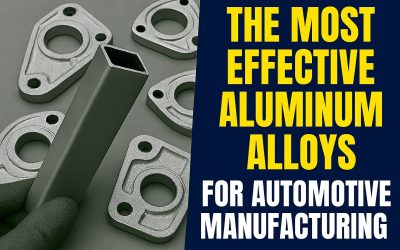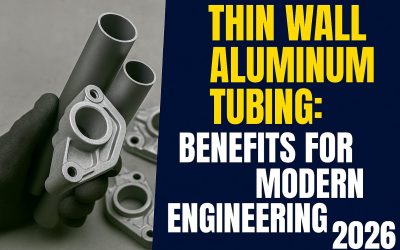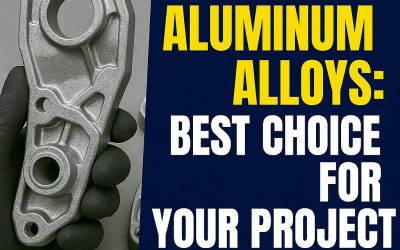Prototypage rapide Avantages de l'aluminium et applications clés
Prototypage rapide en aluminium Le prototypage rapide en aluminium permet de créer immédiatement une pièce physique directement à partir des données du modèle CAO en utilisant différents processus de fabrication. Le prototypage rapide en aluminium peut être utilisé à n'importe quel stade du cycle de développement du produit pour n'importe quel composant ou sous-composant. Le prototypage peut être répété plusieurs fois tout au long du processus de conception du nouveau produit en utilisant les données de test pour obtenir la pièce souhaitée.
Objectif principal du prototypage rapide
L'objectif du prototypage rapide est d'obtenir un premier retour d'information, d'affiner la conception et de répondre à tous les besoins des utilisateurs.
Principalement, le processus de prototypage rapide comprend les trois étapes que sont le test, le prototypage et l'affinage. Dans toute entreprise, les concepteurs utilisent ce processus à différents stades afin d'améliorer leurs solutions en fonction des résultats du prototypage et du retour d'information qu'ils obtiennent des clients ou des utilisateurs.
Dans ce cadre, le concepteur utilise les nouvelles techniques et les vérifie, puis, en fonction des réactions, il apporte des modifications jusqu'à ce que le produit souhaité ne soit pas développé ou prêt. Il travaille jusqu'à ce qu'il reçoive le bon retour d'information de la part du client et apporte des changements grâce à ses nouvelles conceptions et idées.
Pourquoi le prototypage rapide de l'aluminium est-il important ?
Les entreprises doivent introduire et développer de nouveaux produits plus rapidement pour rester compétitives sur ce marché de consommation moderne qui évolue très vite. L'accélération du développement des produits et de l'innovation technologique est donc importante pour la réussite d'une entreprise, prototypage rapide aluminium devient l'élément le plus important du développement d'un nouveau produit. Bien sûr, pour certains d'entre eux, vous pouvez utiliser le prototypage rapide en plastique pour remplacer le prototype en aluminium.
Le prototypage rapide en aluminium présente les caractéristiques suivantes :
- Développement plus rapide de nouveaux produits
- Cela jouera un rôle important dans le processus de création de produits réussis, car cela accélère le processus de développement de nouveaux produits.
- Vérification finale du produit par rapport aux objectifs de l'entreprise et aux exigences techniques
- Validation de l'adéquation, de la forme et de la fonction de la conception/du concept à un stade précoce
- Il permet de tester les fonctionnalités afin de vérifier les objectifs de l'idée et de finaliser la spécification de l'article.
- Le prototype permet au client, à l'utilisateur final, au client et à l'utilisateur participant de faire l'expérience pratique de l'utilisation afin d'obtenir un retour d'information.
Quelles sont les étapes du prototypage rapide en aluminium ?
Création d'un design: À l'aide d'un programme de CAO, un modèle numérique en 3D de l'objet est créé. Cette étape est importante pour jeter les bases du prototype.
Préparation des données : Le modèle CAO est traité et transformé en un format parfait pour la technologie de mise en forme rapide choisie, généralement un fichier STL, STP ou IGS.
Configuration de la machine : La machine de prototypage rapide est calibrée, préparée et chargée avec les bons matériaux, qu'il s'agisse de résine, de plastique ou de poudres métalliques.
Construction d'un prototype : La machine construit le prototype couche par couche, en respectant les caractéristiques du modèle CAO.
Traitement ultérieur : Après la prototypage rapide aluminium Après le processus de construction, le prototype a généralement besoin d'un post-traitement pour obtenir la finition de surface ou les caractéristiques mécaniques souhaitées. Il peut s'agir de peinture, de ponçage, de taraudage ou d'assemblage.
L'importance du prototypage rapide en aluminium dans la fabrication réside dans sa capacité à produire immédiatement un objet physique à partir d'une conception numérique. Il ne s'agit pas seulement d'une question de rapidité, mais aussi d'un moyen tangible d'évaluer et d'affiner la conception d'un produit dès les premières étapes, ce qui rend le processus plus abordable et plus efficace.
Quels sont les avantages du prototypage rapide en aluminium ?
Le prototypage rapide en aluminium est largement utilisé dans un grand nombre d'industries pour la fabrication rapide de prototypes, car il offre de nombreux avantages.
Vitesse élevée
La rapidité est l'un des principaux avantages du prototypage rapide en aluminium. Elle réduit le temps de production à quelques semaines ou quelques jours. Les techniques de fabrication traditionnelles telles que l'usinage CNC, le moulage sous pression, le formage et l'assemblage sont utilisées pour construire une pièce, tandis que le prototypage métallique avec l'impression 3D ne nécessite pas de nouvel outillage pour fabriquer un produit. Le prototypage rapide en aluminium permet de raccourcir le délai de mise sur le marché, de sorte que les nouveaux produits peuvent être lancés immédiatement sur le marché.
Consolidation des pièces
Le prototypage en aluminium simplifie les pièces complexes et réduit la quantité de pièces. Par exemple, il peut réduire un moteur de quarante pièces à dix pièces. C'est une réussite pour les concepteurs, car cela leur permet de créer de meilleures pièces.
Flexibilité de la conception
Le prototypage rapide permet de créer une conception solide. Si la conception du prototype doit être retravaillée, elle peut l'être facilement dans le modèle CAO.
Abordable
L'impression 3D d'un prototype en aluminium est une technique abordable car elle ne nécessite pas d'outils ou de matrices. Elle raccourcit le temps de développement. Les fabricants peuvent réaliser un prototype dans le matériau souhaité avant de se lancer dans une production à grande échelle pour tester la faisabilité et les performances des prototypes.
Applications du prototypage rapide en aluminium
Aujourd'hui, les pièces en plastique ou en métal peuvent être prototypées et fabriquées immédiatement. Il est également possible de créer des prototypes en couleur. À l'aide de données informatiques, les fabricants peuvent appliquer des techniques de prototypage rapide telles que le frittage sélectif par laser, la stéréolithographie (impression 3D), l'impression par jet de couleur, la modélisation par dépôt de matière fondue, l'impression directe sur métal, et même des options d'usinage CNC.
Diverses techniques d'impression 3D et de prototypage rapide permettent de créer des modèles conceptuels. Un modèle de concept physique peut communiquer et démontrer des idées aux ingénieurs, aux concepteurs et aux parties prenantes, plus facilement qu'un modèle virtuel. Des prototypes fonctionnels peuvent être créés, ajoutant chaque détail de la conception et permettant des tests approfondis avant que la production complète ne soit programmée. De l'ajustement des pièces à la fonction et à la fabricabilité d'un article, tous les aspects peuvent être évalués. En savoir plus sur Atelier de prototypage
Lorsqu'un prototype fonctionnel est accessible, les fabricants peuvent déterminer s'ils ont obtenu la conception visuelle et la fonctionnalité qu'ils attendaient. Ils ont également accès à la faisabilité économique du passage à la production. Le processus est utilisé pour tout fabriquer, des simples pièces en plastique ou en métal aux composants des véhicules électriques, en passant par les circuits informatiques.
Pour
- Lorsque vous l'utilisez, vous réduisez le temps de développement et de conception.

- L'utilisation de celui-ci peut réduire le coût du développement complet.
- Cela permet d'évaluer l'ergonomie humaine et les facteurs
- Il permet d'effectuer des tests de fonctionnalité.
- Cela a permis d'améliorer et d'accroître la participation des utilisateurs
- Cela permet d'éliminer les risques.
Cons
- Il ajoutera un coût primaire
- Il a besoin d'une main d'œuvre professionnelle pour l'utiliser.
- Il y a parfois un problème de précision
- Avec ce système, on ne peut utiliser que des matériaux limités.
- Tous les prototypes ne sont pas économiques, certains sont coûteux.
- Parfois, les propriétés du matériau, telles que la résistance et la finition de la surface, ne correspondent pas.
Nous sommes heureux que vous ayez trouvé GC Precision Mould ici. C'est le meilleur endroit en Chine pour obtenir des services exceptionnels de moulage sous pression et de fabrication de moules. Ces services comprennent les moules en plastique, moule de coulée sous pression en aluminiumet une large gamme de pièces moulées sous pression à partir de métaux tels que le magnésium, le zinc et l'aluminium.
Nous sommes GC Precision Mould, et notre objectif est d'offrir les meilleurs services pour les pièces métalliques anodisées et autres produits de moulage. Nos ingénieurs et travailleurs professionnels ont plus de 15 ans d'expérience dans le moulage sous pression, la finition de surface et la fabrication de moules. Grâce à tous ces facteurs professionnels, nous pouvons nous assurer que chaque pièce que nous fabriquons non seulement répond aux normes les plus élevées de qualité et de soin, mais les dépasse également.
Nos produits sont utilisés dans de nombreux secteurs, tels que l'automobile, l'électronique grand public, le matériel médical et les machines lourdes. Nous passons beaucoup de temps avec nos clients pour bien comprendre leurs besoins. Cela nous permet de fabriquer des produits adaptés aux besoins de nos clients.
Nous pouvons vous aider, que vous ayez besoin d'un simple moule en plastique ou d'une ligne de production complète de moulage sous pression. Prenez contact avec nous pour obtenir les meilleures offres et le meilleur service pour votre projet. Moulage sous pression Chine pour les pièces en aluminium qui ont été anodisées ou Fabricant de moules en Chine pour les produits moulés par injection qui ont été peints avec de la peinture en aérosol. Votre succès nous tient à cœur et nous sommes impatients de vous aider dans vos travaux de moulage sous pression de l'acier.





0 commentaires